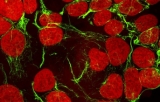AG Scientific
 |
||
A AG Scientific é especializada em metabolitos secundários derivados da fermentação. A maioria dos seus produtos são antibióticos para seleção genética, mas o catálogo também inclui reagentes antimicrobianos, antifúngicos, anticancerígenos, antivirais, antiparasitários e imunossupressores.
Antibióticos:
A AG Scientific, Inc. desenvolveu uma série de agentes de rastreio de antibióticos, incluindo Blasticidin S, G-418, Puromicina, Gentamicina, Kanamicina, Ampicilina, Estreptomicina, Carbenicilina.
Mais recentemente, a AG Scientific estabeleceu parcerias com clientes farmacêuticos que utilizam a tecnologia CRISPR.
Anti-cancro:
O catálogo inclui metabolitos secundários no domínio do cancro, como a rapamicina, FK-506, ciclosporina A.
Sítio Web: www.agscientific.com
| ||

Propidium Iodide
Propidium Iodide (PI) is a nucleic acid stain commonly used to identify dead cells in a population or as a counterstain in multicolor fluorescent techniques. It is a dye impermeable to the cell membrane that intercalates with nucleic acids, with an excitation maximum at 535 nm and an emission maximum at 617 nm. Propidium Iodide is excluded from viable cells with intact membranes, but it can easily penetrate dead or damaged cells, making it a useful tool for identifying cell viability in a population or as a counterstain in multicolor fluorescent techniques.
PI is used in a variety of applications, including DNA and RNA gel electrophoresis, flow cytometry, multiplexing, microscopy, direct labeling, hybridization, PCR, FISH, and probes conjugated to DIG-dUTP. It is also used in the assessment of apoptosis in certain cell populations in heterogeneous tissues, including bone marrow, lymph nodes, and the thymus.
Propidium Iodide is a highly sensitive and versatile nucleic acid stain commonly used to identify cell viability, assess apoptosis, and quantify DNA content in biological samples.
PI intercalates with nucleic acids with a stoichiometric ratio of one dye per 4 to 5 base pairs with little sequence preference and is then detected by fluorescence microscopy and flow cytometry. The fluorescence of PI is increased 20 to 30 times when bound to nucleic acids, making it a highly sensitive stain for detecting dead cells.
Resultado da sua pesquisa : 1 produto encontrado
Refine sua procura :
- Biochemicals 1

